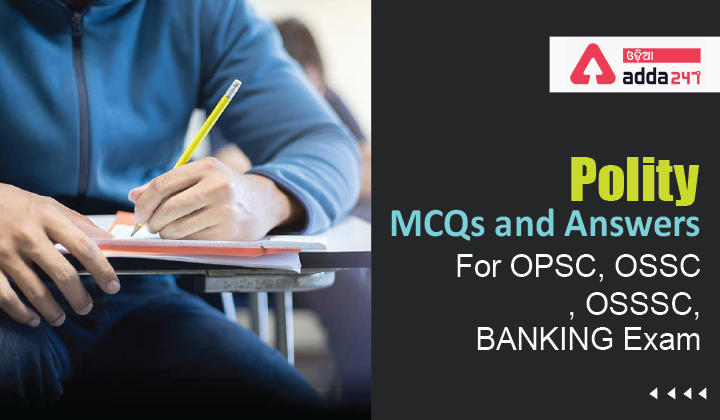Polity MCQs and Answers: Polity MCQs are very important for OPSC, OSSC, OSSSC & Other State Exams. Aspirants who are willing to apply for the various Government exams 2022 must go through the topics of Polity for competitive exams, as Polity is a key part of the syllabus.
Polity MCQs
Q1. When was the Indian Constitution adopted?
- 17th August, 1947
- 26th January, 1940
- 26th March, 1949
- 26th November, 1949
Q2. When did the Indian Constitution come into force?
- 15h January, 1949
- 26th November, 1949
- 26th January, 1950
- 22h November, 1950
Q3. Which of the following parts of the Indian Constitution deals with the name and territory of the Union?
- Part I
- Part VI
- Part V
- Part IV
Q4. Which of the following parts of the Indian Constitution deals with Citizenship?
- Part I
- Part II
- Part III
- Part IV
Q5. Which of the following parts of the Indian Constitution deals with fundamental rights?
- Part I
- Part II
- Part III
- Part IV
Q6. Which of the following articles of the Indian Constitution deals with the Right to Equality?
- Article 11 to 18
- Article 12 to 18
- Article 13 to 18
- Article 14 to 18
Q7. Which of the following articles of the Indian Constitution deals with the Right to Freedom?
- Article 19 to 20
- Article 19 to 21
- Article 19 to 22
- Article 19 to 23
Q8. Which of the following articles of the Indian Constitution deals with the Right against Exploitation?
- Article 21 & 22
- Article 22 & 23
- Article 23 & 24
- Article 24 & 25
Q9. Which of the following articles of the Indian Constitution deals with the Right to Freedom of Religion?
- Article 25 to 27
- Article 25 to 28
- Article 25 to 29
- Article 25 to 30
Q10. Which of the following articles of the Indian Constitution deals with the Cultural and Educational Rights?
- Article 27 & 28
- Article 28 & 29
- Article 29 & 30
- Article 30 & 31
Q11.Which of the following articles of the Indian Constitution deals with the Saving of Certain Laws?
- Article 30
- Article 31
- Article 32
- Article 33
Q12. Which of the following articles of the Indian Constitution deals with the Right to Constitutional Remedies?
- Article 30
- Article 31
- Article 32
- Article 33
Q13. Which of the following articles of Indian Constitution deals with the DPSP (Directive Principles of State Policy)?
- Articles 36 to 51
- Articles 36 to 52
- Articles 36 to 53
- Articles 36 to 54
Q14. Which of the following parts of the Indian Constitution deals with the DPSP (Directive Principles of State Policy)?
- Part III
- Part IV
- Part V
- Part VI
Q15. Which of the following parts of the Indian Constitution deals with the Fundamental Duties?
- Part III
- Part IV
- Part IVA
- Part IVB

ANSWER
S1. Ans, 26th November, 1949
Sol: Indian Constitution was adopted on the twenty-sixth day of November 1949. At the time of its adoption, the Constitution contained 395 Articles and 8 Schedules and was about 145,000 words long, making it the longest national Constitution to ever be adopted.
S2. Ans. 26th January, 1950
Sol: Indian Constitution was adopted on 26th November 1949 and came into force on 26th January, 1950. At the time of its adoption, the Constitution contained 395 Articles and 8 Schedules and was about 145,000 words long, making it the longest national Constitution to ever be adopted.
S3. Ans: Part I
Sol: The Part I of the Indian constitution deal with the name and territory of the Union. It also deals with the Admission or establishment of new States, Formation of new States and alteration of areas, boundaries or names of existing States. Laws made under articles 2 and 3 to provide for the amendment of the First and the Fourth Schedules and supplemental, incidental and consequential matters.
S4. Ans. Part II
Sol: The Part II of the Indian constitution deals with Citizenship at the commencement of the Constitution. It also deals with the Rights of citizenship of certain persons who have migrated to India from Pakistan, Rights of citizenship of certain migrants to Pakistan, Rights of citizenship of certain persons of Indian origin residing outside India, Persons voluntarily acquiring citizenship of a foreign State not to be citizens, Continuance of the rights of citizenship, Parliament to regulate the right of citizenship by law.
S5. Ans.Part IIISol.
Sol: The Part III of the Indian constitution deal with the fundamental rights of Citizens of India. Article 12 to 35 contained in Part III of the Constitution.
S6. Ans.Article 14 to 18
Sol. The right to equality is an important right provided in Articles 14 to 18 of the constitution. It is one of the fundamental right. It ensure the guarantees to every person the right to equality before law & equal protection of the laws. It is not only right of Indian citizens but also right of non-citizens.
S7. Ans. Article 19 to 22
Sol: Article 19 to 22 of Indian constitution deals with the Right to Freedom of Indian Citizens. Freedom is the power or right to act, speak, or think as one wants without hindrance or restraint, and the absence of a despotic government. The right to freedom of association is recognized as a human right, a political freedom and a civil liberty. This freedom can be limited by laws that protect public safety.
S8. Ans. Article 23 & 24
Sol. Article 23 & 24 of Indian constitution deals with the Right against Exploitation. The right against exploitation, given in Articles 23 and 24, provides for two provisions, namely the abolition of trafficking in human beings and Begar (forced labor), and the abolition of employment of children below the age of 14 years in dangerous jobs like factories, mines, etc.
S9. Ans.Article 25 to 28
Sol. Article 25 to 28 of Indian constitution deals with the Right to Freedom of Religion. Everyone has the right to freedom of thought, conscience and religion; this right includes freedom to change his religion or belief and freedom, either alone or in community with others and in public or private, to manifest his religion or belief, in worship, teaching practice and observance.
S10. Ans. Article 29 & 30
Sol. Article 29 & 30 of Indian Constitution deals with the Cultural and Educational Rights. Article 30 mandates that all minorities, whether based on religion or language, shall have the right to establish and administer educational institutions of their choice.
S11. Ans. Article 31
Sol. Article 31 of Indian Constitution provided that “no person shall be deprived of his property save by authority of law.” It also provided that compensation would be paid to a person whose property has been taken for public purposes.
S12. Ans. Article 32
Sol. Article 32 of Indian Constitution deals with the ‘Right to Constitutional Remedies’, or affirms the right to move the Supreme Court by appropriate proceedings for the enforcement of the rights conferred in Part III of the Constitution.
S13. Ans. Articles 36 to 51
Sol. Articles 36-51 of Indian Constitution deals with the Directive Principles of State Policy. Directive Principles of State Policy aim to create social and economic conditions under which the citizens can lead a good life. They also aim to establish social and economic democracy through a welfare state.
S14. Ans. Part IV
Sol. The Part-IV of Indian Constitution deal with Directive Principles of State Policy (DPSP). Part IV of the Indian Constitution shall not be enforceable in any court of law. Social, Political and Economic Justice.
S15. Ans. Part IVA
Sol. Part IVA of the Indian Constitution deals with Fundamental Duties. As of now, there are 11 Fundamental duties. By the 42nd Amendment of the Constitution, adopted in 1976, Fundamental Duties of the citizens have also been enumerated.








